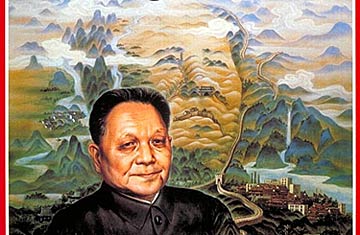
(18 of 20)
Behind his obdurate and inflexible answers lies a reality one cannot dodge: that the Chinese may have finally straightened out their economy. If so, the Japanese challenge to American jobs will be seen as only an opening flare of warning.
JOURNEY THROUGH PARADOX
A journey through China today is a journey through paradox. But no one can understand the paradoxes unless one keeps in mind the history behind them. The men who dominate China were, long ago, students and idealists. They became cruel as they fought and, as they governed, the logic of Communism drove them to further cruelty —until they learned that absolute cruelty has its limits in absolute madness. What they are doing now is trying to untangle their old dreams from the madness those dreams begot.
The epicenter of the paradox lies in the everlasting clash of constraint (unlimited government control) with freedom (unlimited license to people). China's leadership knows that China cannot go forward without huge grants of initiative to its people. But the clash begins at the very bottom, in the danwei, the lowest-level building block of the party's control, which denies every grace of liberty to its members.
You cannot understand China without understanding the danwei.
Everyone in China must belong to a factory, neighborhood, peasant or office danwei. The danwei controls your life. You introduce yourself on the telephone by identifying the danwei to which you belong. The neighborhood danwei assigns you to a job; then you belong to the factory danwei, which decides when you can have a baby and how large an apartment you live in. It can also transfer you to a danwei in a distant province and your wife to another. And so, up the line, to absolute control.
Since such absolute control did not work, the new leadership is trying to transfer more authority to the provinces, more autonomy to the cities, more responsibility to the peasant villages. But, as reins are let loose, other problems sprint. How does one settle the impending dispute between the provinces of Sichuan and Hubei over how they will share the electric power from the huge dams planned in the throat of the Yangtze gorges? Or deal with the growing resistance of newly autonomous provinces to the army's network of farms, arsenals, production plants? What does the new peasant "responsibility" imply with its grant of free dom to let peasants grow then-own crops? If too much enterprise develops in the countryside, can it be denied to city dwellers? Can city youths be denied the right to open shops, restaurants, trading booths?
The contradictions and paradoxes bewilder any one who tries to chart China's future. Chinese have synthesized insulin, flung satellites into space, made nuclear bombs — yet do not supply their villages with adequate common matches. Baoshan, the huge new steel complex near Shanghai, is a state-of-the-art operation. But steel production requires heavy cargo of both coking coal and ore, and the river creek on which the Baoshan plant was built could not take heavy-laden ships. So iron ore must be shipped to the Philippines and then transshipped in small boats to Baoshan.
